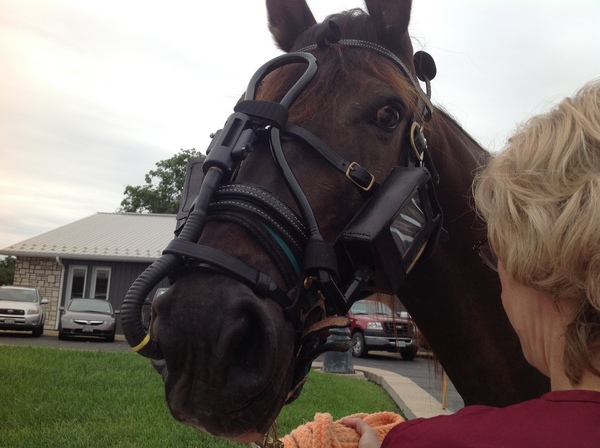Mid-Rivers Equine Centre offer traditional endoscopy and dynamic endoscopy. A traditional endoscope allows our doctors view the respiratory system with the patient is at rest. Because airway dysfunction may only occur during exercise, we also offer dynamic endoscope. This allows the doctor to record upper airway function while the horse walks, trots, and canters (with or without a rider).

Dynamic Endoscope
Diagnosing & Treating Respiratory Dysfunctions
To diagnose possible respiratory dysfunctions in your horse, Mid-Rivers Equine Centre can provide scoping, as mentioned above, to identify any problems as well as:
- X-rays of the skull, chest, and neck
- Transtracheal wash to obtain fungal and bacterial samples
- Biopsies to diagnose tumors or other diseases
- Arterial blood gas test (ABG)
Should a patient require surgical intervention to treat severe respiratory dysfunctions like guttural pouch infections, and sinus trephanation and exploration, Mid-Rivers’ has a full surgery suite and experienced staff on call 24/7.
Causes Of Respiratory Dysfunction
There are different causes of respiratory dysfunction in horses including, if not limited to:
- Pneumonia
- Injury to the lungs
- Infections
- Guttural pouch problems
- Viruses like EHV-1
- Allergies
Signs Your Horse Is In Respiratory Distress
If your horse expressing the following symptoms, they may be experiencing respiratory distress and you should contact your veterinarian:
- Coughing
- Shortness of breath
- Nasal discharge
- Hypoxemia (low oxygen in the blood)
- Wheezing
- Rapid heartbeat
- Roaring (loud respiratory noise during exercise)
Even though not all causes of respiratory dysfunction is life threatening, it is important to discern its cause and treat dysfunction as soon as possible.
Keeping your horse vaccinated can help prevent your horse from developing a respiratory diseases like EHV and Flu.